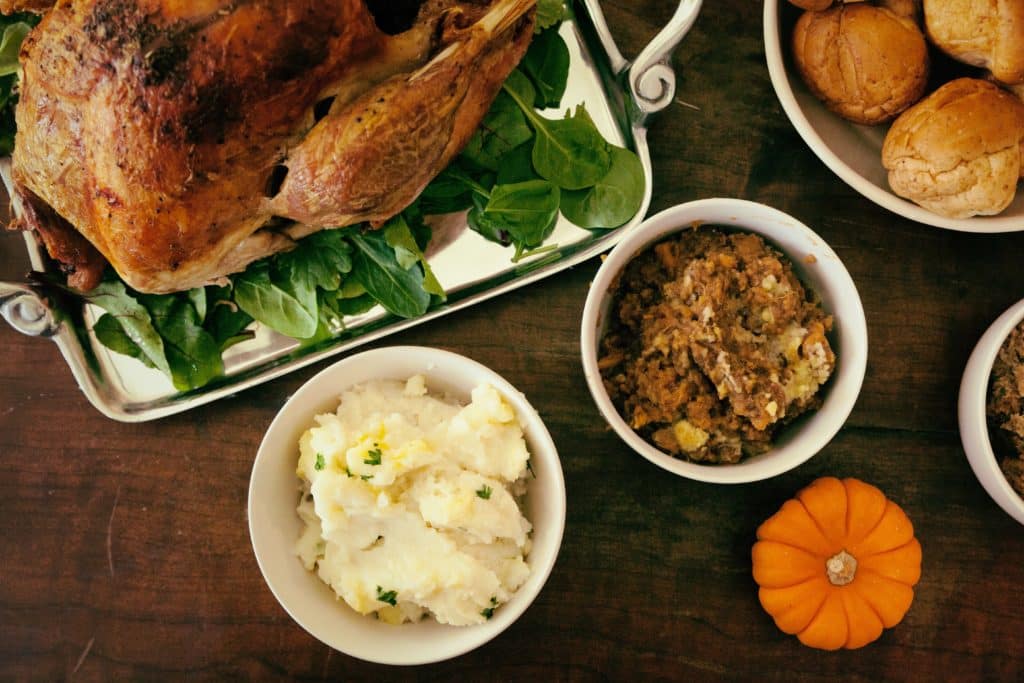Tips for A Successful Thanksgiving When You’ve
Got a Newly Sober Family Member at the Table
Got a Newly Sober Family Member at the Table
Table of contents
If you’ve ever invited someone in addiction recovery to your home for Thanksgiving, you know that it can be a delicate situation. One moment of weakness could lead your loved one right back to active addiction.
What makes Thanksgiving especially risky? It’s the perfect storm of stressors — travel, extended family, toasting with alcohol, and the pressure of perfection. But there are ways to mitigate risk and make it a positive experience for everyone. Here are some ways that you can support your loved one in recovery while helping them feel included at Thanksgiving dinner.
Talk in Advance
Don’t expect your family member to know what to anticipate for their first sober Thanksgiving with your family. Make time to sit down and discuss expectations, boundaries, and triggers with your loved one in recovery. You can even invite them to help you plan the event as an exercise in family bonding. This will also ensure their involvement in the planning process and provide the opportunity to voice concerns as they arise. Be sure to listen to any worries that your loved one expresses during the planning process. If an idea makes them uncomfortable, set them at ease by dropping the idea without any fuss. Even if it’s a long-standing Thanksgiving tradition, it’s not worth the discomfort of someone you care about.
Don’t Be Afraid to Set Boundaries
While you don’t want to make your loved one’s first Thanksgiving with your family a tense affair, you also don’t want to encourage alcohol use. Discuss individually with those attending that no one is to be pressured into drinking. If your family has a wine-toasting tradition, make sure nonalcoholic options are available. Know your loved one’s boundaries and make sure they are being respected by those in attendance. Advocate for the safety and sobriety of the person you care for.
Have a Support Person on Hand
A support person is someone who helps the person in recovery stay on track. Ideally, your loved one will be able to spot the triggers and the people who might push them off the path toward recovery. However, people in early recovery are often hyper-vigilant, in addition to being more easily triggered. If your loved one is still in early recovery and struggling to remain abstinent, having a support person on hand can help. You can also help your loved one by recognizing the signs of impending relapse and stepping in to intervene. If you notice your loved one engaging in self-sabotaging behavior or isolating, you can help them stay on track. But be cautious of appearing to “babysit” your loved one in recovery. Don’t condescend to their progress or their struggles.
Provide Activities and Distraction
Help your loved one avoid boredom and the temptation to drink or engage in other destructive behaviors by keeping them engaged. Be honest about your expectations, and don’t push too hard. Here are some suggestions:
- Take a walk outside: Fresh air is a great way to relieve stress
- Play a game: Choose a game that doesn’t involve drinking
- Cook Together: Invite your recovering loved one to help you prepare the Thanksgiving meal
Include Nonalcoholic Options
You don’t have to completely skip out on delicious, seasonal beverages to protect your loved one from drinking. You can create mocktails that are just as festive and delicious. But be sure that these options won’t trigger your loved one with any sensory similarity to real alcohol. Discuss the idea with them and gauge their comfort ahead of time. Additionally, it’s just as helpful to serve normal nonalcoholic options like soda, water, or even something festive like cranberry juice.
Detox With Briarwood
Briarwood Detox Center offers detox treatment for alcohol, opioid, methamphetamine, prescription drugs, and much more. Our experienced clinical staff provides round-the-clock monitoring throughout the detox process and our therapy team provides support to help manage the emotional response to treatment. Additionally, we have detox facilities located in Austin, Houston, and Colorado Springs with state-of-the-art amenities.
Briarwood is dedicated to facilitating a healthy and safe environment that empowers people to make significant and lasting changes in their lives. We look forward to supporting you or your loved one on the journey to recovery. Call (512) 277 – 3103 today for more information on our programs and admission process.
Break Free From Your Addiction Today
(in 3 easy, confidential steps)

Verify your insurance
Complete our fast, free, and easy verification process over the phone to determine the extent of your insurance coverage.

Make an informed decision
We will provide personalized placement recommendations based on your insurance, treatment needs, financial situation, and schedule.

Contact us
Call (888) 857-0557 or fill out our online form for a free and confidential personal consultation with an admissions specialist.








